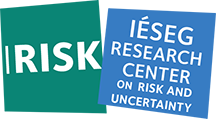The impact of the ongoing energy crisis, climate change, the Covid 19 pandemic, or the war in Ukraine: these are just some examples of current societal challenges which create extreme levels of uncertainty for individuals, organisations, companies and policymakers worldwide. Despite the risks involved, all of these groups need to look to make effective decisions in situations of deep uncertainty. The IÉSEG Research Center on Risk and Uncertainty (iRisk) works to better understand and improve decisions about environmental, health, wealth, and other risks through impartial economic research.
In collaboration with the AXA Research Fund, iRisk organised on July 2022, a major international conference on `decision-making under risk and uncertainty’, which brought together different experts from a wide range of disciplines. Following a scientific workshop gathering leading international scholars from around the world (including a Nobel prize winner, Lars Peter Hansen), four experts – from the fields of industry, policymaking, and academia – took part in a panel session `making decisions in an uncertain world’.
Panel of international experts
The panel was comprised of Vicky Pollard, Acting Head of the “Foresight, Economic Analysis & Modelling” unit at the Directorate-General for Climate Action of the European Commission; Gilles Moëc, AXA Group Chief Economist and AXA IM Head of Research; Christian Gollier, Professor of Economics at the Toulouse School of Economics, and Mathias Dewatripont, Professor of Economics at the Université Libre de Bruxelles.
Led by journalist Thibault Lieurade from the Conversation France, the discussions covered a wide range of topical issues including the ‘Fit for 55 package’ the EU’s planned package of legislation for a green transition. They also addressed how uncertainty effects such policy initiatives to tackle climate change, including the attitudes of consumers towards, for example, greener forms of transport.
Other topics covered included the lessons that could be taken from decision-making during the Covid-19 pandemic relating to vaccine strategies or the economy including the challenges that politicians face in helping the public to understand that the future is uncertain.
It was also the opportunity for some of these experts – who have participated in different expert and policy groups – to discuss how scenarios are now used in policymaking and how risk and uncertainty could better integrated to policymaking. The full panel event can be viewed here:
Making rational and transparent decision-making in uncertain times
Professor Loïc Berger, Director of iRisk and CNRS researcher (IÉSEG School of Management), notes: “This event was a great opportunity to bridge the gap between theory and practice and to discuss challenges faced by practitioners in addressing decision-making under risk and uncertainty. It will also nurture future interdisciplinary collaborations on complex decision-making challenges, both within different research fields and between research and practice.”
In the framework of this conference, Professor Berger also recently contributed an article to the Conversation France which addressed some of the key challenges facing policymakers – in particular in terms of the multitude of information (quantitative and qualitative) that they must consider before taking decisions.
He looks at how decision theory can potentially be used to help policymakers improve the way they take decisions and notes that decision theorists have developed alternative rules that aim to clarify and improve the decision-making process. These rules allow decision-makers to balance their subjective judgments about the weights to be assigned to various alternative models and to recognize that the information underlying these judgments is limited.
Additional information
- A full summary of the panel’s discussion is available on the AXA Research Fund website
- The experts’ interviews:
-
- Interview of Gilles Moëc, Chief Economist of AXA Group, AXA Group Chief Economist and AXA IM Head of Research
-
- Interview of Christian Gollier, Professor and Managing Director at the Toulouse School of Economics
-
- Interview of Mathias Dewatripont, Professor at the Université libre de Bruxelles
-
- Interview of Itzhak Gilboa, Professor of Economics and Decision Sciences
-
- After movie of the event

